

Why Objectivity Still Matters. The notion that reporters should be objective is taking a beating these days, and the assault couldn’t come at a worse time for the public.
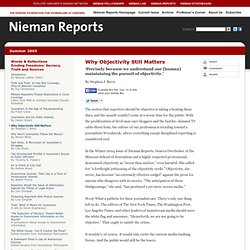
With the proliferation of devil-may-care bloggers and the factsbe- damned TV cable shout fests, the culture of our profession is trending toward a journalistic Woodstock, where everything except disciplined reporting is considered cool. In the Winter 2004 issue of Nieman Reports, Geneva Overholser of the Missouri School of Journalism and a highly respected professional, denounced objectivity as “worse than useless,” even harmful. She called for “a forthright jettisoning of the objectivity credo.” Objectivity, she wrote, has become “an extremely effective cudgel” against the press for anyone who disagrees with its stories. “The anticipation of these bludgeonings,” she said, “has produced a yet more craven media.”
Wow! It wouldn’t, of course. Objectivity has been on the ropes before. Reclaiming Objectivity Stephen J. Principles of Journalism. The first three years of the Project’s work involved listening and talking with journalists and others around the country about what defines the work.

What emerged out of those conversations are the following nine core principles of journalism: 1. Journalism’s first obligation is to the truth Democracy depends on citizens having reliable, accurate facts put in a meaningful context. Journalism does not pursue truth in an absolute or philosophical sense, but it can–and must–pursue it in a practical sense. 2. While news organizations answer to many constituencies, including advertisers and shareholders, the journalists in those organizations must maintain allegiance to citizens and the larger public interest above any other if they are to provide the news without fear or favor. 3. Journalists rely on a professional discipline for verifying information. 4. YouTube. ”Objectivity in journalism is an illusion” The Handbook Of Mass Media Ethics - Lee Ed Wilkins, Clifford G. Christians. Social Norms - Michael Hechter. Journalism, Objectivity, Objectivity in News Reporting, Fox News, MSNBC. Is objectvity dead?
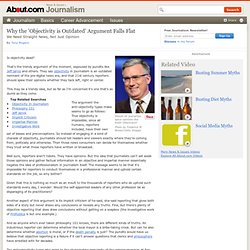
That's the trendy argument of the moment, espoused by pundits like Jeff Jarvis and others. They say objectivity in journalism is an outdated remnant of the pre-digital news era, and that 21st century reporters should spew their opinions whether they tack left, right or center. This may be a trendy idea, but as far as I'm concerned it's one that's as dumb as they come. The argument the anti-objectivity types make seems to go as follows: True objectivity is impossible, since all humans, reporters included, have their own set of biases and preconceptions.
So instead of engaging in a kind of charade of objectivity, journalists should tell readers and viewers exactly where they're coming from, politically and otherwise. Well sure, reporters aren't robots. Another aspect of this argument is its implicit criticism of he-said, she-said reporting that gives both sides of a story but never draws any conclusions or reveals any truths. An Argument Why Journalists Should Not Abandon Objectivity.
In “Losing the News: The Future of the News that Feeds Democracy,” published by Oxford University Press, Alex S.
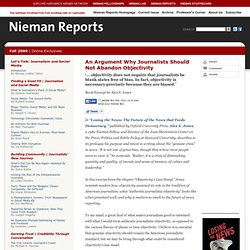
Jones, a 1982 Nieman Fellow and director of the Joan Shorenstein Center on the Press, Politics and Public Policy at Harvard University, describes in its prologue his purpose and intent in writing about the “genuine crisis” in news. The Myth of Objectivity in Journalism. By This page has been accessed since 29 May 1996.
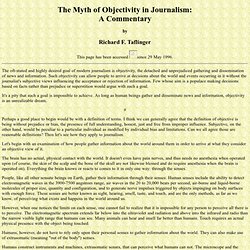
Martha Raddatz and the faux objectivity of journalists. Numerous commentators (including me) were complimentary of the performance of Martha Raddatz as the moderator of Wednesday night's vice-presidential debate.
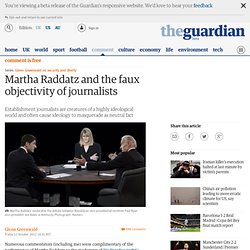
She was assertive, asked mostly substantive questions, and covered substantial ground in 90 minutes. That's all true enough, but the questions she asked reveal something significant about American journalism in general and especially its pretense of objectivity. For establishment journalists like Raddatz, "objectivity" is the holy grail. In their minds, it is what distinguishes "real reporters" from mere "opinionists" and, worse, partisans. As they tell it, this objectivity means they traffic only in straight facts, unvarnished by ideology or agenda. Three things. Leave aside whether that is even a desirable mindset. These assumptions are almost always unacknowledged as such and are usually unexamined, which means that often the journalists themselves are not even consciously aware that they have embraced them.
In Defence of a Supposedly Outdated Notion: The Range of Application of Journalistic Objectivity. Gilles Gauthier (Université Laval) If thought is to go far enough, the imagination must go further.

If the will is to accomplish enough, it must imagine more. Gaston Bachelard, La formation de l'esprit scientifique Among all the clichés that clutter up human minds, there is one which gives rise to a stir of approval in its audience each time it is sententiously pronounced: "Objectivity does not exist--in reporting. " Objectivity (journalism) Journalistic objectivity is a significant principle of journalistic professionalism.
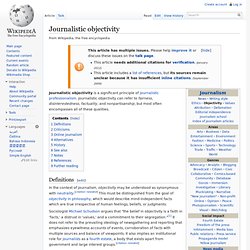
Journalistic objectivity can refer to fairness, disinterestedness, factuality, and nonpartisanship, but most often encompasses all of these qualities. Definitions[edit] Sociologist Michael Schudson argues that "the belief in objectivity is a faith in 'facts,' a distrust in 'values,' and a commitment to their segregation.